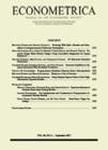-
作者:AUSUBEL, LM; DENECKERE, RJ
摘要:This paper analyzes a class of alternating-offer bargaining games with one-sided incomplete information for the case of no gap. If sequential equilibria are required to satisfy the additional restrictions of stationarity, monotonicity, pure strategies, and no free screening, we establish the Silence Theorem: When the time interval between successive periods is made sufficiently short, the informed party never makes any serious offers in the play of alternating-offer bargaining games. A class o...
-
作者:ROBSON, AJ
作者单位:University of Michigan System; University of Michigan; Tilburg University
摘要:This paper supposes an individual cares about his/her own wealth not only directly but also via the relative standing that this wealth induces. The implications for risk-taking are investigated in particular. Such a model provides a natural explanation of the concave-convex-concave utility described by Friedman and Savage. However, there are a number of key differences between the present model and any model based on own wealth alone. For example, an equilibrium wealth distribution here may ha...
-
作者:CUMBY, RE; HUIZINGA, J
作者单位:University of Chicago
-
作者:STERN, S
-
作者:AGHION, P; HOWITT, P
作者单位:Western University (University of Western Ontario)
摘要:A model of endogenous growth is developed in which vertical innovations, generated by a competitive research sector, constitute the underlying source of growth. Equilibrium is determined by a forward-looking difference equation, according to which the amount of research in any period depends upon the expected amount of research next period. One source of this intertemporal relationship is creative destruction. That is, the prospect of more future research discourages current research by threat...
-
作者:MACHINA, MJ; SCHMEIDLER, D
作者单位:Tel Aviv University; University System of Ohio; Ohio State University
摘要:The goal of choice-theoretic derivations of subjective probability is to separate a decision maker's underlying beliefs (subjective probabilities of events) from their preferences (attitudes toward risk). Classical derivations have all relied upon some form of the Marschak-Samuelson Independence Axiom or the Savage Sure-Thing Principle, which imply that preferences over lotteries conform to the expected utility hypothesis. This paper presents a choice-theoretic derivation of subjective probabi...
